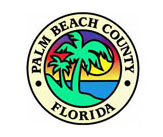The Palm Beach County Commission approved its five-year road plan on Tuesday, which includes major improvements to the intersection and road widening at Seminole Pratt Whitney Road and Northlake Blvd.
The county plans to spend a total of $296 million on roadwork from 2018 to 2022.
County Engineer David Ricks said there are 26 major projects that will begin in 2018. The five-year program is updated each year. Funding for the program comes from various sources, including impact fees, proportionate share, gas taxes and the infrastructure sales tax.
In reference to questions raised at the preliminary hearing on the Seminole Pratt/Northlake improvements, county staff said the plan calls for three major projects scheduled for 2019 at a cost of $16.9 million, including Seminole Pratt Whitney Road from Orange Blvd. to Northlake Blvd., as well as the intersection, and Northlake Blvd. east of Seminole Pratt Whitney Road to Hall Blvd.
Seminole Pratt will be widened from two lanes to four at a cost of $3.4 million. Northlake Blvd. from Seminole Pratt to Hall Blvd. will be widened from two lanes to four lanes at a cost of $4.3 million. The intersection improvements will cost about $4 million.
The overall plan calls for spending about $69 million in 2018, $95 million in 2019, $53 million in 2020, $44 million in 2021 and $35 million in 2022.
Palm Beach County Mayor Melissa McKinlay asked why there was a steep drop-off in funding from 2019 to 2022, and County Administrator Verdenia Baker said that as projects continue to move through the process, and staff recognizes additional sales tax revenue coming in, they will make adjustments.
Other projects in the western communities include the widening of Royal Palm Beach Blvd. to five lanes from north of Persimmon Blvd. to the M Canal and south of the M Canal to Orange Blvd.
Commissioner Paulette Burdick said she hoped that the future designs for transportation include more options. She added that she sees diminishing funding in the future from the federal government for infrastructure improvements.
“The balance of that is going to be paid by the states, the counties and our cities, and I’m concerned about continuing to expand roadways and trying to move people,” Burdick said, adding that an effort to attract Amazon to the area by the Business Development Board had failed due to deficient transportation. “They are looking for alternatives for transporting people, getting them out of cars.”
McKinlay said the federal tax package in the process of being approved this week will affect the county’s ability to finance municipal bonds, and restrict the ability of state and local governments to levy taxes.
“The issue they will supposedly take up after that is the infrastructure bill, which was a campaign promise for $1 trillion in infrastructure investments,” she said. “Now, one of the proposals is that it would be about $200 billion.
She said the $800 billion would have to be made up by showing the federal government when the county applies for projects that it has “skin in the game,” meaning that local governments have increased property taxes, sales taxes, state gas taxes or some other creative revenue source to finance that difference.
“So, here we go again sending our tax dollars to Washington, having our tax ability and our financing ability capped at the state level, and trying to be expected to finance all of these great projects that we need in the community,” McKinlay said.
Burdick made a motion to approve the five-year road plan, which carried 7-0.
In other business, the commissioners approved an assessment for a water main installation at 52nd Court North in The Acreage.
Stiles said the project includes the installation of about 1,500 feet of 6-inch and 8-inch water main, including fire hydrants, with 12 water service connections at a total cost of $159, 877. That includes the engineering design fee, construction cost, inspection and administration. The contractor is Johnson & Davis Construction.
The project was approved by 58 percent of the 52nd Court residents, with seven in favor, four not in favor and one not responding.
The petitions were considered and approved at the regular meeting of the Indian Trail Improvement District Board of Supervisors on Oct. 12. Individual assessments of $11,990.76 per parcel will be levied, based on 90 percent of the total estimated cost of the project.
In an agreement between the county and ITID, the county has committed to allocate $500,000 to provide financial support for up to 10 percent of the final cost for assessment projects within ITID’s legislative boundaries.
The Palm Beach County Water Utilities Department has spent a total of $287,553 for previous ITID assessment projects. Each individual assessment was determined by using the parcel method to divide the assessable cost per parcel. Assessments are payable over a 20-year time period in equal annual payments of principal and 5.5 percent interest.
Commissioner Mack Bernard made a motion for approval, which carried 7-0.








